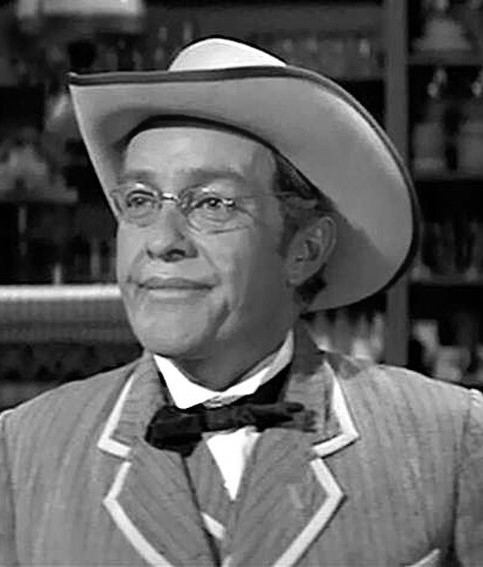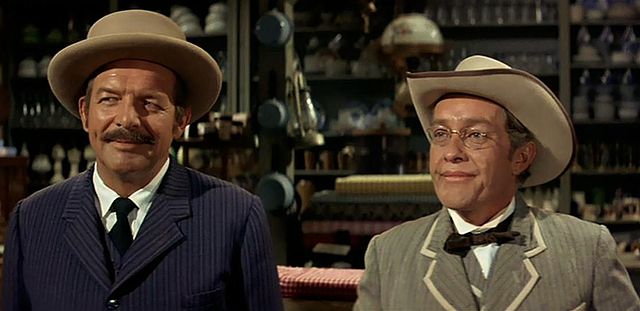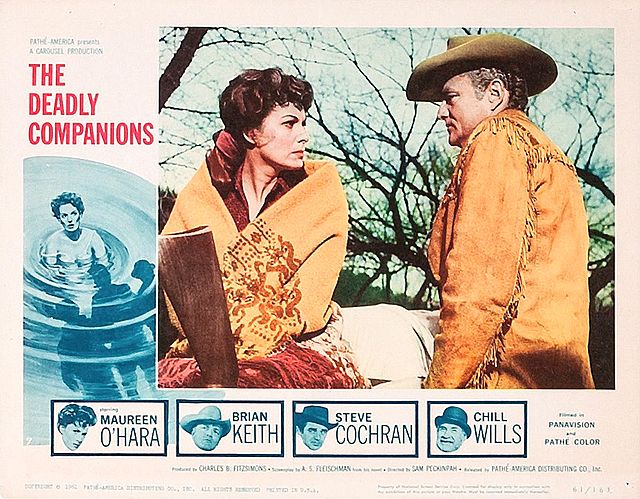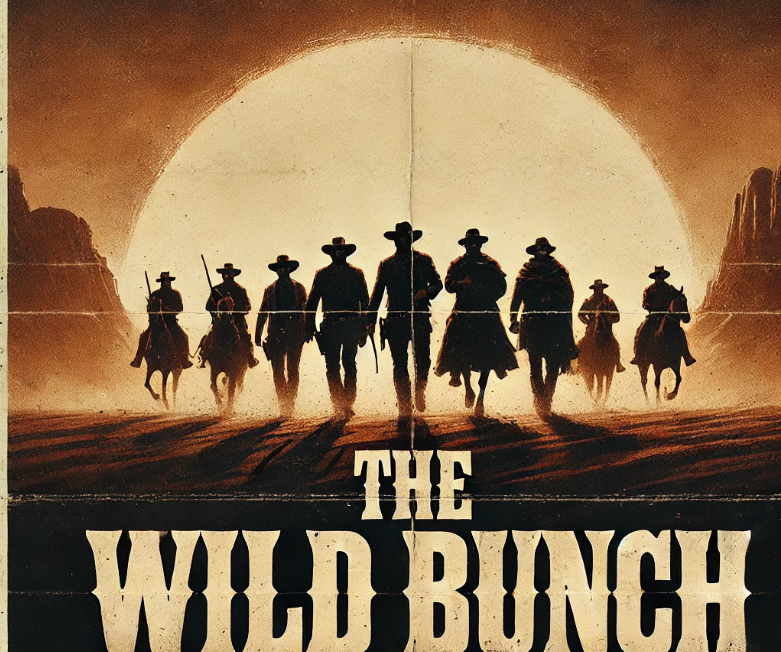Strother Martin (1919 – 1980)
Biography and Movie Career
Strother Douglas Martin Jr. was born on March 26, 1919, in Kokomo, Indiana. A man of unique talent and unparalleled versatility, he built a career as one of Hollywood’s most iconic character actors. Known for his distinctive voice and knack for memorable lines, Martin left an indelible mark on cinema, particularly in the Western and drama genres.
Early Years and Personal Life
Strother was the youngest of three children in his family. His father, Strother Sr., was an electrical engineer, which led the family to move frequently during Martin’s childhood. From an early age, he exhibited a natural athleticism and an affinity for the outdoors. His family often supported his athletic pursuits, and as a teenager, he excelled in swimming and diving, earning the nickname "T-Bone Martin" due to his slim physique.
Martin's talent in diving eventually led him to compete nationally. At the age of 17, he won the National Junior Springboard Diving Championship. His skills earned him a spot at the University of Michigan, where he studied and competed on the university’s swimming and diving teams. However, a career as a professional athlete eluded him, and he began searching for a new path.
Path Toward Success
After completing his education, Strother Martin enlisted in the U.S. Navy during World War II, serving as a swimming instructor. Following the war, he transitioned to a career in Hollywood. His start, like many actors, was humble—working as a swimming coach and stunt diver. Eventually, his interests turned to acting, and he began landing small roles in films and television.
Martin's breakthrough came when he embraced the role of a character actor, which allowed him to bring quirky, eccentric, and sometimes menacing personalities to life on screen. His unconventional looks and distinct voice made him stand out, and directors sought him for roles that required more than just a typical leading man.
Hollywood Stardom
Throughout the 1950s and 1960s, Martin’s career flourished. He worked with legendary directors such as John Ford, Sam Peckinpah, and George Roy Hill, becoming a fixture in Westerns and dramas. His collaborations with Paul Newman were particularly fruitful, with Martin appearing in films like Cool Hand Luke (1967), Butch Cassidy and the Sundance Kid (1969), and The Sting (1973).
His role as the sadistic Captain in Cool Hand Luke remains his most iconic. The line “What we’ve got here is failure to communicate,” delivered with cold menace, became a cultural touchstone, cementing his legacy in film history.
Martin also enjoyed a prolific television career, appearing in numerous series such as Gunsmoke, Rawhide, Bonanza, The Twilight Zone, and The Virginian. His versatility allowed him to move seamlessly between comedy, drama, and action.
Passions and Personality
Outside of acting, Strother Martin was known for his wit, charm, and unassuming nature. Despite often portraying gruff or villainous characters, he was a kind and gentle person in real life. Martin was an avid reader, with a particular love for literature and history. He also enjoyed outdoor activities, including hiking and fishing, which he pursued whenever his schedule allowed.
Marriages and Personal Life
Strother Martin married Helen Meisels in 1948. The couple shared a deep bond and remained together for over three decades until Martin’s death. Helen, a painter, often described Strother as her muse, and she supported his career wholeheartedly. The couple did not have children, but they surrounded themselves with friends and extended family.
Later Years and Legacy
Martin continued to work steadily into the late 1970s, earning accolades for his performances. However, his health began to decline due to heart-related issues. On August 1, 1980, Martin suffered a fatal heart attack in Thousand Oaks, California, at the age of 61. His death was a significant loss to Hollywood, as he was regarded as one of the finest character actors of his time.
Strother Martin was laid to rest at Forest Lawn Memorial Park in Hollywood Hills, California. His gravestone stands as a quiet tribute to a man who brought unforgettable characters to life on screen.
Conclusion
Strother Martin’s legacy endures as a testament to the power of character acting. His ability to steal scenes with just a few lines, his mastery of eccentric and memorable roles, and his enduring presence in some of cinema’s greatest films make him a cherished figure in Hollywood history. His life, filled with dedication to his craft and love for those around him, remains an inspiration for actors and fans alike.
Measurements Strother Martin
• Height: Approximately 5 feet 6 inches (168 cm)
• Weight: Estimated around 140-150 pounds (64-68 kg) during his prime.
• Build: Slim and wiry, which complemented his ability to play both vulnerable and cunning characters.
Interview with Strother Martin
Strother Martin’s Acting Style
Strother Martin’s acting style was marked by a combination of sharp precision, deep authenticity, and a unique ability to transform himself into a wide range of characters. His performances, often understated yet undeniably memorable, showcased his understanding of human behavior, which he translated into some of the most eccentric and colorful characters in film and television history.
Eccentricity and Character Depth
Martin had an innate ability to portray eccentric characters with authenticity and depth, ensuring that even the most unconventional roles felt genuine. His quirky mannerisms, distinct voice, and offbeat charm made him a natural fit for characters who operated on the fringes of society—whether they were scheming villains, corrupt officials, or hapless sidekicks. He often brought a layer of complexity to these roles, showing vulnerability or humor beneath the surface.
Mastery of Villainy
While Strother Martin played a wide array of characters, his portrayal of villains and morally ambiguous figures stood out. He could inject menace and cruelty into his roles without overacting, relying instead on subtle gestures, sharp dialogue delivery, and his piercing gaze. His role as the Captain in Cool Hand Luke exemplifies this ability, as he perfectly balanced an outwardly calm demeanor with a chilling authoritarianism.
Comedy and Timing
Though many remember Martin for his darker or dramatic roles, his talent for comedy was equally remarkable. He had a sharp sense of timing and an expressive face that could deliver humor in the subtlest ways. His comedic performances often relied on his knack for playing characters who were oblivious to their own absurdity, which created moments of unintentional hilarity.
Versatility and Adaptability
One of Martin’s greatest strengths as an actor was his versatility. He was equally convincing as a grizzled prospector, a sadistic prison captain, a beleaguered businessman, or a bumbling buffoon. This adaptability made him a favorite among directors, as he could bring credibility to roles across genres, from Westerns and dramas to comedies and action films.
Distinctive Voice and Delivery
Martin’s distinctive voice, characterized by its raspy quality and unique cadence, became one of his trademarks. He used his vocal inflections to great effect, adding layers of meaning to his lines. Whether delivering a menacing threat or a comedic remark, his voice always drew attention and added weight to his performances.
Attention to Detail
Martin had a meticulous approach to his craft, paying attention to the smallest details of his characters. He often incorporated physical quirks, such as a limp or an exaggerated posture, to enhance his roles. These details gave his performances a lived-in quality, making his characters feel like real people with histories and motivations.
Humanizing the Unlikable
Even when portraying antagonists or morally flawed characters, Martin managed to imbue them with a sense of humanity. This made his roles more nuanced and prevented his villains from becoming caricatures. Audiences often found themselves intrigued by his characters, even when they were designed to be despised.
Legacy
Strother Martin’s acting style was not about commanding the spotlight but rather about enhancing the narrative and supporting the story’s emotional and thematic weight. His performances added texture and color to the films he appeared in, making him a quintessential character actor. His ability to blend humor, menace, and pathos ensured that he could never be pigeonholed, and his work continues to resonate with audiences and inspire actors today.
Movie Quotes and Personal Quotes
Strother Martin delivered several memorable lines throughout his career, many of which have become iconic in film history. Here are some of his most notable quotes:
"Cool Hand Luke" (1967)
• "What we’ve got here is failure to communicate."
This line, delivered by Martin as the sadistic Captain, is one of the most famous in cinema history. It captures the harsh authoritarianism of his character and has been widely quoted in pop culture.
"The Wild Bunch" (1969)
• "Give them back their guns, boys!"
As bounty hunter Coffer, Martin delivers this line with his trademark blend of menace and dry humor, adding tension to the scene.
"The Ballad of Cable Hogue" (1970)
• "Well, now, that's the thing about the desert—it’s always changing, always the same."
This line reflects the poetic and reflective side of Martin’s acting, highlighting the philosophical undercurrents in the film.
"Rooster Cogburn" (1975)
• "A man's got to do what he thinks is right, even if it ain't always easy."
This line from Martin’s portrayal of Shanghai McCoy underscores his character’s rugged wisdom in the film.
"The Villain" (1979)
• "You can’t trust anyone these days, not even a villain."
This comedic line showcases Martin’s ability to bring humor to even the most absurd situations.
Personal Quotes
• "There’s a kind of madness that comes with being cooped up too long."
A reflection of his knack for capturing the tension and eccentricity of his characters.
• "I ain't saying I’m right, but I ain’t saying I’m wrong either."
A line that encapsulates Martin’s talent for playing morally ambiguous characters.
Awards and Recognition
Strother Martin, renowned for his distinctive character portrayals, received notable recognition during his career. In 1974, he was nominated for a Golden Globe Award for Best Supporting Actor in a Series, Limited Series, or Motion Picture Made for Television for his role as R.J. Hawkins in the CBS crime drama "Hawkins."
Strother Martin in Movies
1950s:
• "The Asphalt Jungle" (1950): A crime drama about a meticulously planned jewelry heist that goes awry. Martin appears in a minor role as a witness.
• "The Damned Don't Cry" (1950): A woman rises from poverty to become a gangster's moll, only to face tragic consequences. Martin has a small uncredited role.
• "The Red Badge of Courage" (1951): An adaptation of Stephen Crane's novel about a young soldier's experiences during the Civil War. Martin's role is uncredited.
• "Kiss Me Deadly" (1955): A film noir centered on a private investigator's search for a mysterious and deadly box. Martin plays Harvey Wallace.
• "The Shaggy Dog" (1959): A comedy about a teenage boy who transforms into a sheepdog due to a magical ring. Martin appears as Thurm.
1960s:
• "The Deadly Companions" (1961): Strother Martin plays Parson, a supporting character in this Western directed by Sam Peckinpah. The film follows a group of outcasts—including a soldier, a widow, and her child—on a journey through dangerous territory. Martin's role adds depth and color to the rugged, morally complex world of the story.
• "The Man Who Shot Liberty Valance" (1962): A senator returns to a western town for a funeral and recounts his claim to fame: shooting a notorious outlaw. Martin portrays Floyd, the town's undertaker.
• "Cool Hand Luke" (1967): A rebellious prisoner challenges the authority of a Southern chain gang. Martin delivers the iconic line, "What we've got here is failure to communicate," as the Captain.
• "The Wild Bunch" (1969): An aging outlaw gang attempts one last big score on the Texas-Mexico border. Martin plays Coffer, a bounty hunter.
• "Butch Cassidy and the Sundance Kid" (1969): Two outlaws flee to Bolivia to escape law enforcement after a series of train robberies. Martin appears as a colorful character.
• "True Grit" (1969): A young girl enlists a tough U.S. Marshal to track down her father's murderer. Martin portrays Colonel G. Stonehill, a horse trader.
1970s:
• "The Ballad of Cable Hogue" (1970): A prospector, left to die in the desert, discovers a spring and builds a thriving business. Martin plays Reverend Joshua Sloane.
• "Rooster Cogburn" (1975): A U.S. Marshal teams up with a preacher's daughter to track down outlaws who have stolen a shipment of nitroglycerin. Martin appears as Shanghai McCoy.
• "The Villain" (1979): A comedic Western where a charming thief attempts to rob a beautiful woman and her dimwitted protector. Martin plays Parody Jones.
• "Up in Smoke" (1978): Two stoners unknowingly smuggle a van made entirely of marijuana from Mexico to L.A. Martin has a cameo as Arnold Stoner.
• "The Secret Life of Nikola Tesla" (1980): A biographical film exploring the life and inventions of the enigmatic scientist Nikola Tesla. Martin portrays George Westinghouse.




